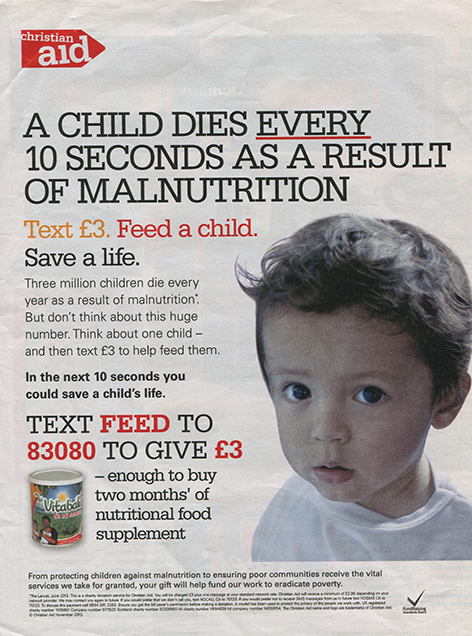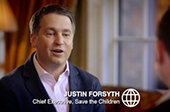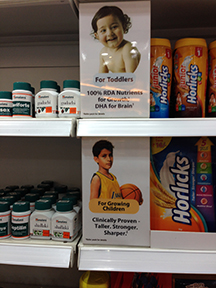Spotlight on Charity fundraising - Sport Relief and others
Its obvious that charities need to pull on the heartstrings to get people to reach for their purses, but isn't it about time that those with huge audiences took more care with their messaging?
Increasingly we are seeing appeals that take us back to the dark ages, showing hungry babies and young children being fed some product of another. Rarely do we see well-thought out meesages that raise public consciousness about the underlying causes of malnutrition and suggest sustainable ways to address them.
Added to our usual worries, we know that partnering with high profile charities is a key CSR strategy used by many corporations who are seeking to change traditional eating patterns and taste preferences and promote their ultra processed foods.
In Update 46 we highlight the lack of efficacy of many of the commercially produced Ready-to-Use products that are now commonly promoted by the larger charities.
We work with and are partners of many of these agencies. They want us to trust that their funding sources will not distort their priorities and that they will always put public health and child rights first. One way to do this could be to stop linking appeals to nutrition products, especially branded ones.
Below are some examples of why we are worried.
Sport Relief Friday 21st March 2014. BBC TV
One of the appeals focussed on a report by Emma Willis from a Children's Hospital in Kathmandu in Nepal. This showed a 6 week old baby whose mother had apparantly 'failed' to breastfeed.The baby was fed some sort of liquid by spoon while the mother looked on. The baby eventually died. Soon after a message flashed on the screen said that a donation of £50 would feed children for 2 months. Nothing was mentioned about the critical importance of breastfeeding or what could have been done to help the woman.
We have written to Sport Relief but have not yet had an answer.
For information about the fforts to protect breastfeeding in Nepal see:
CLICK HERE for a report card from South Asia
CLICK HERE Nepal Meeeting report
Christian Aid full page adverts and Transport posters across London, December 2013 -March 2014
The UK charity, Christian Aid was one of our first long-term funders and is well known for tackling the root causes of poverty. It has few corporate donors and a strict funding policy. However, like other charities, it is looking for appeals that will be financially successful.
The advert below promotes a fortified nutrition supplement (with no information about what it contains) and donors are told that if they donate £3 'In the next 10 seconds you could save a child’s life.'
 Christian Aid ad
Christian Aid ad
We contacted Christian Aid who told us that the aim is to follow through with donors, taking them on a journey where the wider context and complexities of land-grabbing, dispossession, mono-cultures, corporate tax breaks etc are explained. Hmmm, maybe. But doesn't the ad set the scene for the very companies responsible for these problems and whose top strategic priority is to change traditional eating patterns? And what message does the general public receive?
Cosying up to charities
2013 saw two new partnerships that could affect infant health: World Vision International with DSM (a major manufacturer of formula ingredients) and Save the Children UK with Glaxo Smith Kline (GSK).
BBC’s Panorama, All in a good Cause, broadcast on December 2013, examined this trend, interviewing Justin Forsyth, Save the Children UK’s CEO and Dominic Nutt, its former Head of News.
In the last 3 years its income from corporations has gone up 5-fold from £3.9m to £21m in 2013, 8% of its total. The Save the Children Alliance has a global turnover of $1.6bn.
The GSK deal, worth £15m over 3 years, could, according to Justin Forsyth, save ‘millions’ of children’s lives. Dominic Nutt explained how the move from small donors to corporate funding can impact on charities’ willingness to criticise potential funders: ‘People are beginning to edit themselves, the culture has percolated right down and no one is willing to challenge that culture.’
We became concerned on learning that the GSK partnership may involve the development of a nutrition product for babies. We really hope not. These issues are complex and tying fundraising to products has many risks and can distort an agency’s priorities (see pgs 24, 31).
 Justin Forsyth on BBC Panorama
Justin Forsyth on BBC Panorama GSK Junior Horlicks promotion in India
GSK Junior Horlicks promotion in India
Above:
Justin Forsyth, CEO on BBC Panorama, 10th December 2013
GSK Display for Junior Horlicks for toddlers, Delhi, Nov 2013
- Login to post comments






